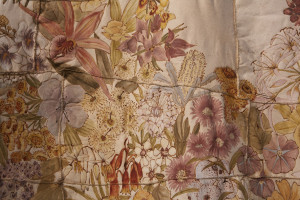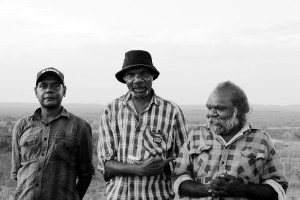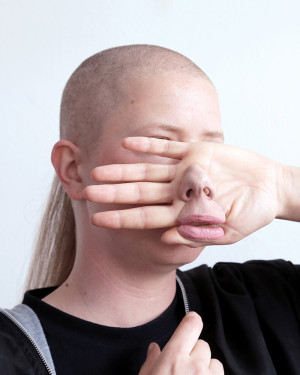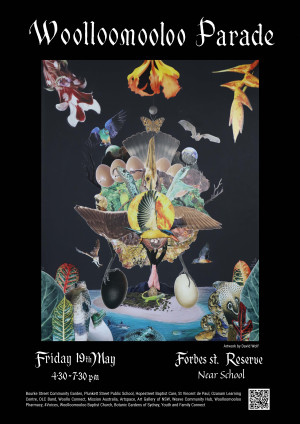Panel Discussion
out of country:blood and bone
Wed 20 Jan 2021
Live online via Zoom
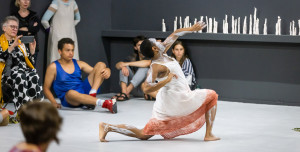
Your Zoom link will be included in your e-ticket
RSVP Here
Judy Watson’s new commission, skullduggery, stems from research into the early 1930s theft of a skull and king plate from the grave of Aboriginal man Tiger, known as ‘King of the Mines’ of Lawn Hill near the Gulf of Carpentaria in northwest Queensland. King Tiger’s skull and king plate were presented to Agnes Kerr, Matron at Burketown Hospital, who then sent them to the Wellcome Historical Medical Museum (now Wellcome Collection) in London for their collection after extensive correspondence with the institution. While King Tiger’s skull was returned to the National Museum in Canberra in the 2000s, where it awaits repatriation from his community, his king plate remains in the Wellcome collection.
out of country: blood and bone brings together key academics, curators and activists to discuss the history of trade in Australian Aboriginal ancestral remains and material culture, the contemporary connection to these from living Aboriginal peoples, and the complex issues around repatriation.
With speakers: Dr Lyndon Ormond-Parker, Dr Gaye Sculthorpe, Professor David Trigger, Judy Watson; moderated by Daniel Browning
Dr Lyndon Ormond-Parker is an ARC Research Fellow in the Indigenous Studies Unit, Centre for Health Equity, Melbourne School of Population and Global Health, University of Melbourne. He was born in Darwin and is of Alyawarr descent from the Barkly tablelands region of the Northern Territory. Ormond-Parker is a cultural heritage expert who has advocated for Indigenous cultural rights, including the repatriation of human remains and material culture. He is a supporter of a National Resting Place for unprovenanced Aboriginal and Torres Strait Islander human remains returned to Australia from overseas.
Dr Gaye Sculthorpe is Head of the Oceania Section in the Department of Africa, Oceania and the Americas at the British Museum. Her research currently focuses on historical Australian Indigenous collections in the United Kingdom and Ireland. She has recently been an investigator on two Australian Research Council (ARC) Linkage Projects: The Relational Museum and its Objects and Collecting the West: Reimagining Western Australia from its Collections. She co-authored Indigenous Australia: Enduring Civilisation (British Museum Press, 2015) and curated the exhibition of the same name at the British Museum in 2015. Gaye is co-editor and contributing author of a book about Indigenous Australian collections in the United Kingdom and Ireland, being published by British Museum Press in 2021 and is beginning a new research project with colleagues at the Australian National University and community members in Australia titled 'Mobilising Aboriginal History in International Museums', focusing on objects from the Sydney region. She is a palawa woman from Tasmania, being a descendant of Aboriginal woman Tanganutura from north east Tasmania and her famous daughter Fanny Smith who recorded Aboriginal songs in 1899 and 1903.
Professor David Trigger is Professor Emeritus of Anthropology at the University of Queensland and Adjunct Professor at the University of Western Australia. His research interests encompass the different meanings attributed to land and nature across diverse sectors of society. His research on Australian society includes projects focused on a comparison of pro-development, environmentalist and Aboriginal perspectives on land and nature. His most recent works address senses of historical place that both overlap and diverge for people of diverse ancestries in northern Australia. In Australian Aboriginal Studies, he has carried out more than 35 years of anthropological study on Indigenous systems of land tenure, including applied research on resource development negotiations and native title. He is the author of more than 70 major applied research reports and has acted as an expert witness in multiple native title claims and associated matters involving Aboriginal customary law. Trigger is the author of Whitefella comin': Aboriginal responses to colonialism in northern Australia (Cambridge University Press) and a wide range of scholarly articles.
Daniel Browning is an Aboriginal journalist, radio broadcaster, documentary maker, sound artist and writer. Currently, he produces and presents Awaye!, the Indigenous art and culture program on ABC RN, a specialist radio network of Australia's national broadcaster. Awaye! surveys contemporary Indigenous cultural practice across the arts spectrum. A visual arts graduate, Daniel is also a widely-published freelance arts writer. He is a former guest editor of Artlink Indigenous, an occasional series of the quarterly Australian contemporary arts journal. He is the curator of Blak Box, a specially-designed sound pavilion commissioned by Urban Theatre Projects, the performing arts company based in western Sydney. He studied English and Art History at the University of Queensland before graduating with a degree in visual arts from the Queensland University of Technology. Daniel is a descendant of the Bundjalung and Kullilli peoples of far northern New South Wales and south-western Queensland.
